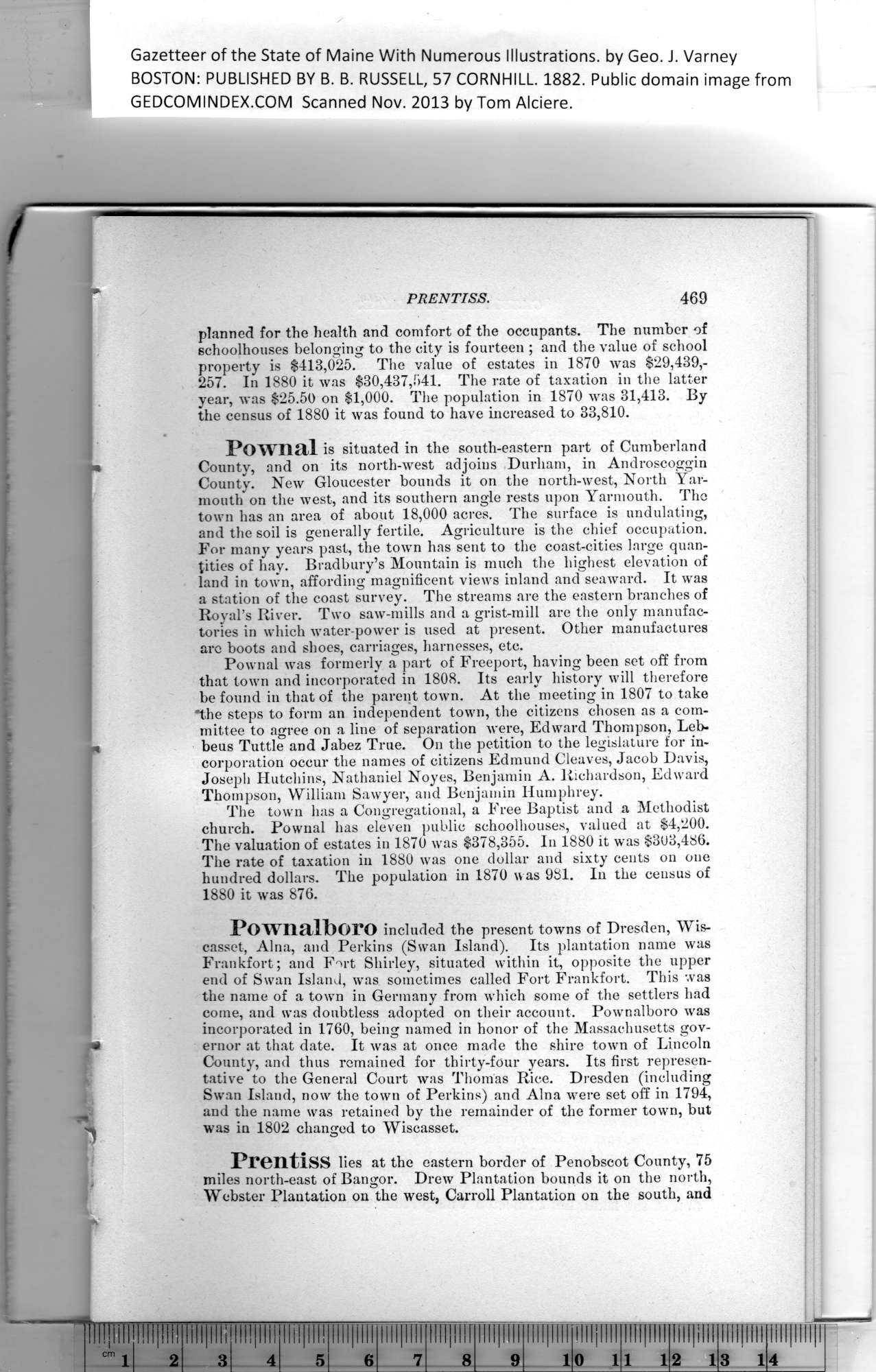|
Gazetteer of the State of Maine With Numerous Illustrations, by Geo. J. Varney
BOSTON: PUBLISHED BY B. B. RUSSELL, 57 CORNHILL. 1882. Public domain image from
PRENTISS. 469
planned for the health and comfort of the occupants. The number of
schoolhouses belonging to the city is fourteen ; and the value of school
property is $413,025. The value of estates in 1870 was $29,439,-
257. In 1880 it was $30,437,541. The rate of taxation in the latter
year, was $25.50 on $1,000. The population in 1870 was 31,413. By
the census of 1880 it was found to have increased to 33,810.
Pownal is situated in the south-eastern part of Cumberland
County, and on its north-west adjoins Durham, in Androscoggin
County. New Gloucester bounds it on the north-west, North Yar-
mouth on the west, and its southern angle rests upon Yarmouth. The
town has an area of about 18,000 acres. The surface is undulating,
and the soil is generally fertile. Agriculture is the chief occupation.
For many years past, the town has sent to the coast-cities large quan-
tities of hay. Bradbury’s Mountain is much the highest elevation of
land in town, affording magnificent views inland and seaward. It was
a station of the coast survey. The streams are the eastern branches of
Royal’s River. Two saw-mills and a grist-mill are the only manufac-
tories in which water-power is used at present. Other manufactures
arc boots and shoes, carriages, harnesses, etc.
Pownal was formerly a part of Freeport, having been set off from
that town and incorporated in 1808. Its early history will therefore
be found in that of the parent town. At the meeting in 1807 to take
*the steps to form an independent town, the citizens chosen as a com-
mittee to agree on a line of separation were, Edward Thompson, Leb-
beus Tuttle and Jabez True. On the petition to the legislature for in-
corporation occur the names of citizens Edmund Cleaves, Jacob Davis,
Joseph Hutchins, Nathaniel Noyes, Benjamin A. Richardson, Edward
Thompson, William Sawyer, and Benjamin Humphrey.
The town has a Congregational, a Free Baptist and a Methodist
church. Pownal has eleven public schoolhouses, valued at $4,200.
The valuation of estates in 1870 was $378,355. In 1880 it was $303,486.
The rate of taxation in 1880 was one dollar and sixty cents on one
hundred dollars. The population in 1870 was 981. In the census of
1880 it was 876.
Pownalboro included the present towns of Dresden, Wis-
casset, Aina, and Perkins (Swan Island). Its plantation name was
Frankfort; and Fort Shirley, situated within it, opposite the upper
end of Swan Island, was sometimes called Fort Frankfort. This was
the name of a town in Germany from which some of the settlers had
come, and was doubtless adopted on their account. Pownalboro was
incorporated in 1760, being named in honor of the Massachusetts gov-
ernor at that date. It was at once made the shire town of Lincoln
County, and thus remained for thirty-four years. Its first represen-
tative to the General Court was Thomas Rice. Dresden (including
Swan Island, now the town of Perkins) and Aina were set off in 1794,
and the name was retained by the remainder of the former town, but
was in 1802 changed to Wiscasset.
Prentiss lies at the eastern border of Penobscot County, 75
miles north-east of Bangor. Drew Plantation bounds it on the north,
Webster Plantation on the west, Carroll Plantation on the south, and
PREVIOUS PAGE ... NEXT PAGE
This page was written in HTML using a program written in Python 3.2
|
